Many people think that confidence is something you either have or you don’t. But that’s not true.
Confidence can be built up over time, like learning a new skill or getting better at a sport.
It involves trying new things, getting good at them, and learning to ride out the failures. Every step you take builds a bit more of that sturdy, feel-good factor inside you.
So, whether you’re looking to feel better about speaking in front of your class, want to try out for a sports team, or just want to feel more comfortable being yourself, this guide is packed with simple steps to help you build that confidence.
1. Start by Setting Small, Achievable Goals
Building self-confidence doesn’t have to be overwhelming. One of the easiest ways to start is by setting small goals that you know you can achieve.
These goals could be as simple as making your bed every morning or finishing a book you’ve been meaning to read.
The key is to make these goals realistic, something that feels doable in your daily life.
Every time you reach one of these goals, it gives you a sense of accomplishment. That feeling, even from something small, builds momentum.
You start realizing, “Hey, I can do this!” Over time, that confidence spreads into bigger tasks or challenges.
It’s like stacking bricks—you’re building a foundation of belief in yourself, one small success at a time.
The best part? These small wins show that you’re capable. You start proving to yourself that you can tackle more.
The more you achieve, the more confidence you gain. It’s not about being perfect; it’s about making steady progress that feels good.
2. Practice Positive Self-Talk

How you talk to yourself matters. If you’re always criticizing yourself or doubting your abilities, it’s going to take a toll.
Instead, try shifting those thoughts into something more positive. For example, rather than saying, “I’m so bad at this,” replace it with, “I’m learning, and I’ll get better.”
It’s a simple switch but makes a huge difference in how you feel about yourself.
Speaking kindly to yourself helps boost your self-esteem. You wouldn’t talk to a friend harshly, so why do it to yourself?
Treating yourself with the same kindness and encouragement you’d give others helps you build confidence over time. The way you speak to yourself sets the tone for how you approach challenges and setbacks.
The more you practice positive self-talk, the more natural it becomes. It may feel strange at first, but that’s okay.
Over time, those positive affirmations will help you believe in your abilities. It’s not about ignoring difficulties, but about reminding yourself that you’re capable of handling them.
3. Step Out of Your Comfort Zone
Growth doesn’t happen in the comfort zone. To build confidence, sometimes you’ve got to take a small step into the unknown.
It doesn’t have to be anything drastic—just something that challenges you a little.
Maybe it’s speaking up in a meeting or trying a new hobby. Pushing yourself to do something you haven’t done before helps you realize what you’re truly capable of.
Once you step outside of that comfort zone, you’ll notice something interesting: it’s not as scary as it seemed.
The more you do this, the easier it becomes. Even when things don’t go perfectly, just trying gives you a confidence boost because you know you faced your fears head-on.
Taking risks, even small ones, teaches you that failure isn’t the end of the world. You can handle it, learn from it, and move on.
That’s where real confidence starts to grow—by doing things that stretch your abilities and prove to yourself that you’re more capable than you thought.
4. Surround Yourself with Supportive People

The people you spend time with have a big influence on how you feel about yourself.
Surrounding yourself with positive, encouraging friends or family members can make a world of difference.
These are the people who believe in you, even when you’re feeling unsure. Their support helps lift you up and boosts your confidence.
Spending time with supportive people also gives you a chance to see yourself through their eyes.
Sometimes, we’re our own worst critics, but those close to us can remind us of our strengths and potential.
Having a good support system means you’re not facing challenges alone. You’ve got people cheering you on, which makes it easier to take on new things with confidence.
On the flip side, it’s important to distance yourself from those who constantly bring you down or make you doubt yourself. Negative energy can be draining and harmful to your confidence.
Surrounding yourself with people who want the best for you is a key step in building a positive mindset and stronger self-belief.
5. Focus on Your Strengths
Everyone has strengths, but sometimes it’s easy to focus on what’s lacking instead.
Shifting attention to what you’re good at can seriously boost your self-confidence.
Think about the skills you’ve mastered or the positive traits you naturally have. Maybe you’re a great listener, a good problem-solver, or someone who’s always reliable.
Recognizing those strengths helps you see that you bring value to the table. It’s not about being good at everything—no one is. It’s about appreciating what you already have and using those abilities to your advantage.
Even listing out your strengths on paper can give you a clearer picture of how capable you are.
Building confidence becomes easier when you embrace what you’re already good at. Those strengths can become stepping stones for tackling bigger challenges.
Leaning into them can help you feel more secure in who you are, making it easier to face new situations with assurance.
6. Learn from Mistakes, Don’t Dwell on Them

Mistakes happen to everyone. Instead of getting stuck on them, use them as learning opportunities.
Every mistake carries a lesson, so it’s important to shift focus from feeling bad about it to understanding what can be learned. Taking this approach helps build resilience, which is a key part of confidence.
No one’s perfect, and expecting perfection can be damaging. Making a mistake doesn’t mean failure; it means you’re trying, which is what matters most.
Confidence grows from these experiences, from knowing that you can bounce back and improve.
Mistakes are part of growth. Treat them as stepping stones, not roadblocks.
By learning from them, you get stronger, and your self-confidence deepens because you understand that setbacks are part of the journey, not the end of it.
7. Take Care of Your Body and Mind
Feeling good physically and mentally plays a huge role in self-confidence.
Simple habits like regular exercise, eating well, and getting enough sleep can help boost your mood and energy.
Taking care of yourself builds a foundation that supports confidence. When you feel strong and healthy, it’s easier to feel capable in other areas of life too.
Mental health matters just as much. Taking time to relax, practicing mindfulness, or journaling can help clear your mind and manage stress.
A clear mind allows you to focus better and make decisions with confidence. It’s about taking small steps each day to ensure both body and mind are in a good place.
Self-care isn’t just about bubble baths or spa days. It’s about maintaining daily habits that make you feel good inside and out.
Confidence comes more naturally when you’re functioning at your best, both mentally and physically.
Related Articles
How To Stop Being Lazy: 15 Practical Solutions
How To Not Care What People Think Of You
8 Tips To Find Yourself When You’re Feeling Lost or Stuck
8. Celebrate Small Wins
Every accomplishment, no matter how small, deserves to be recognized. Celebrating small wins helps reinforce a positive mindset.
Whether it’s finishing a project, learning a new skill, or simply following through on a goal, acknowledging these moments builds confidence over time.
Each small victory gives a sense of pride. You start realizing how far you’ve come, and that fuels your motivation to keep pushing forward.
Confidence grows as you recognize that you’re making progress, even on a smaller scale.
Celebrate yourself. These small celebrations create a positive cycle of motivation and self-belief.
Over time, you’ll find it easier to tackle bigger challenges because you’ve already proven to yourself that you can succeed, one step at a time.
9. Be Kind to Yourself

Being hard on yourself can damage confidence. Treating yourself with kindness and understanding helps you feel more comfortable in your own skin.
Everyone has tough days or moments of doubt, but being patient and giving yourself grace makes a big difference.
Positive self-talk plays a role here too. Instead of criticizing every little thing, remind yourself that nobody’s perfect.
Showing self-compassion during setbacks helps you bounce back quicker and stay confident in the long run.
Self-kindness isn’t about lowering your standards. It’s about being fair to yourself, understanding that growth takes time, and knowing it’s okay to make mistakes.
You deserve to give yourself the same kindness you’d give a friend.
10. Master a Skill
Getting really good at something gives a huge confidence boost. Picking a skill you enjoy and dedicating time to mastering it helps you feel accomplished.
Whether it’s learning to cook, play an instrument, or becoming skilled at a sport, putting in the effort to improve can do wonders for your self-esteem.
Progress feels satisfying. Each time you practice and notice improvement, it reinforces your belief in your abilities.
The journey of mastering a skill teaches patience and perseverance, and both of those qualities feed into your overall sense of confidence.
Once you’ve mastered a skill, the pride and self-assurance that comes from it spill over into other areas of your life.
The focus isn’t just on the skill itself but on the mindset you’ve built—knowing you can take on challenges and come out stronger.
11. Read Books
Reading books can also boost self-confidence in surprising ways.
Books offer knowledge, new perspectives, and inspiration that can shift how you see yourself and the world.
Diving into subjects that interest you helps expand your understanding and skills, which leads to feeling more capable in different situations.
Books provide insights and solutions. Whether it’s self-help, fiction, or non-fiction, there’s always something to learn. Learning new things through reading can build your confidence because you feel more informed and prepared to handle challenges.
Plus, reading regularly strengthens focus and discipline. These are valuable traits that boost your belief in yourself over time.
The more you learn, the more empowered you feel to tackle life’s ups and downs with confidence.




